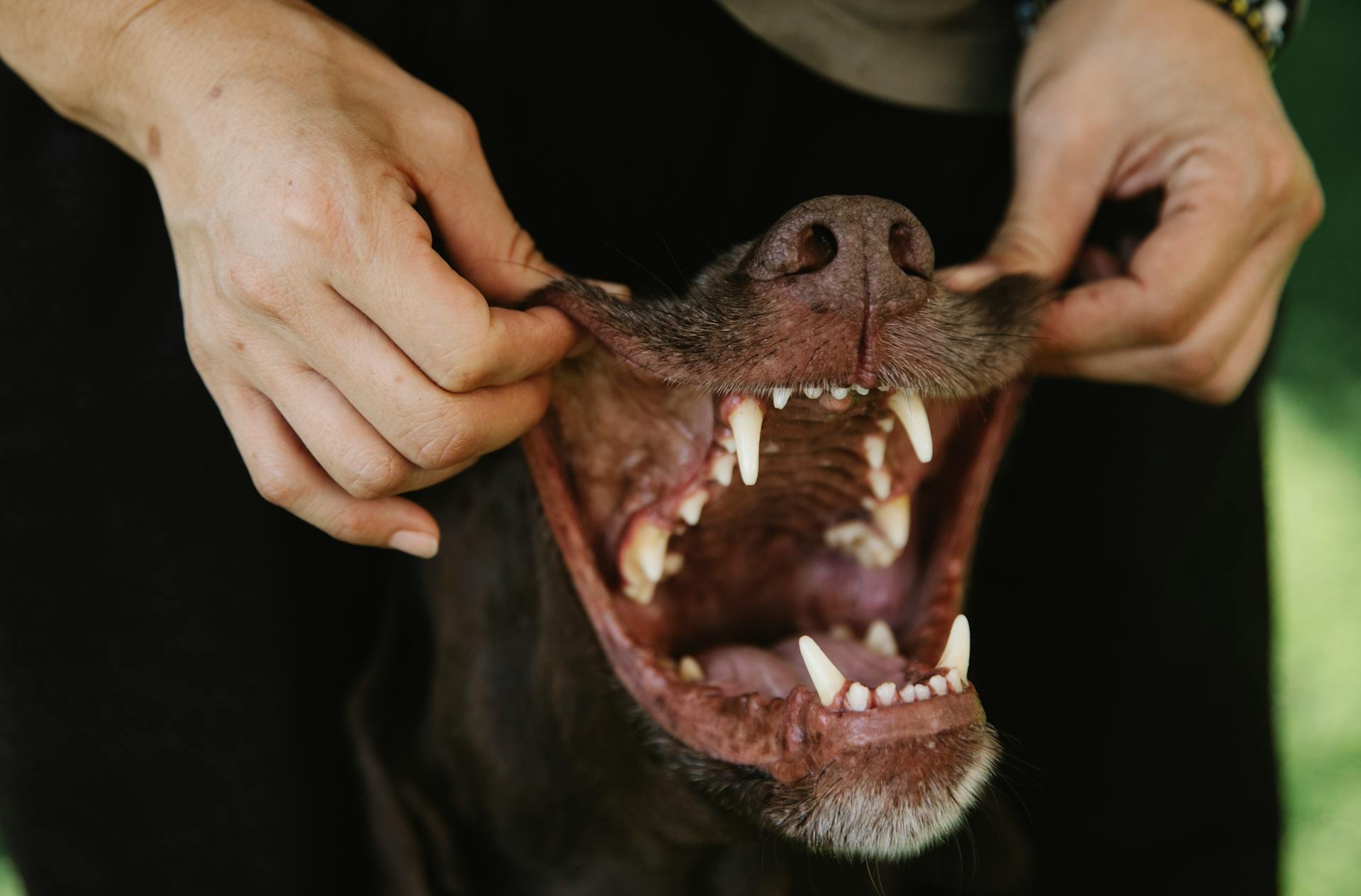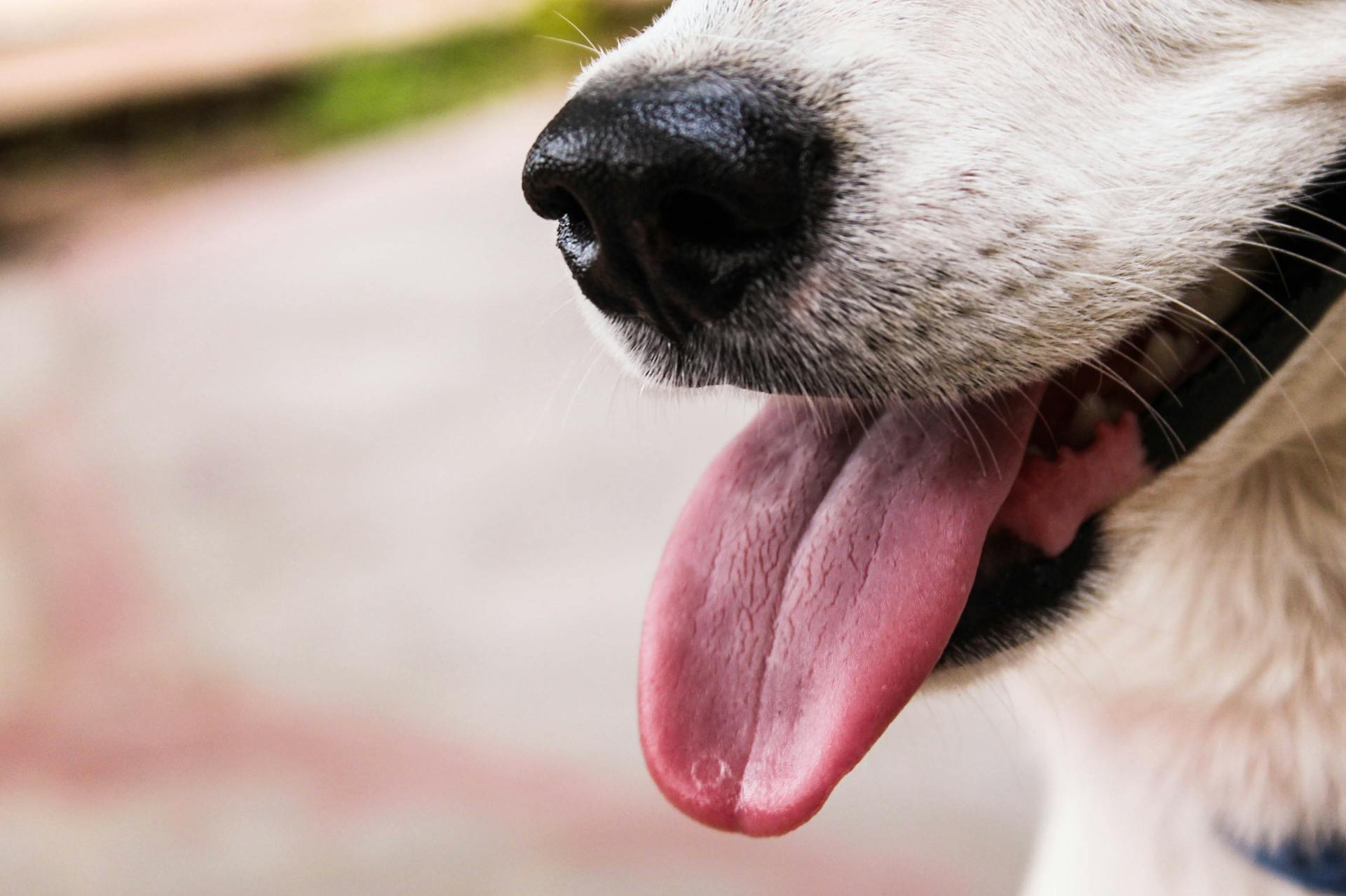
Dog spit, also known as dog saliva, has been touted as a natural remedy for wound healing, but is it really effective? According to research, dog saliva contains an enzyme called lysozyme, which has antimicrobial properties that can help combat infections.
Some proponents of using dog spit on wounds claim that it can speed up the healing process by promoting tissue repair and reducing inflammation. However, there's limited scientific evidence to support these claims.
The idea of using dog spit on wounds may have originated from the fact that dogs are known to lick their own wounds, which can help clean and protect them. This behavior is often cited as evidence of the healing properties of dog saliva.
In reality, while dog saliva may have some antimicrobial properties, it's not a substitute for proper medical treatment. In fact, introducing foreign substances to a wound can sometimes do more harm than good.
Suggestion: My Dog Spit up White Foam
The Science Behind Dog Spit
Dog spit has some amazing properties that make it a natural remedy for minor wounds. The antibacterial properties of dog saliva play a crucial role in wound healing.
Enzymes and chemicals in a dog’s saliva can help clean wounds, preventing infections and promoting faster healing.
Canine saliva has been found to contain certain elements that aid in the healing process, making it a useful tool for minor wound care.
Benefits and Risks of Dog Spit
Dog spit has antibacterial properties that can aid in wound healing, but it's essential to be aware of the potential risks involved.
Dog saliva can kill certain bacteria, such as Streptococcus canis and E. coli, which can infect wounds.
However, there's also a risk of introducing harmful bacteria or reopening the wound, which can lead to infections or irritations.
Research shows that some animals' saliva, including that of dogs, possesses tissue and nerve growth-promoting properties that speed healing.

A 1990 study co-written by Dr. Benjamin Hart found that dog saliva kills a form of strep that primarily infects animals.
On the other hand, a 2018 study compared canine and human saliva and found multiple immune and cell growth proteins specific to dog saliva.
It's always best to consult with a veterinarian to determine the most appropriate wound care for your furry friend, as they can help you weigh the benefits and risks of dog spit.
Understanding Dog Spit's Healing Properties
Dog spit has been found to contain enzymes and antibacterial properties that can help clean wounds and prevent infections. Specifically, some studies suggest that canine saliva may have antiseptic qualities that can help kill bacteria and promote wound healing.
Dog saliva has been shown to contain certain elements that aid in the healing process, making it a natural remedy for minor wounds. This is why dogs instinctively lick their wounds to remove dirt and debris, promoting healing.

Research has found that dog saliva can kill a form of strep that primarily infects animals (Streptococcus canis), as well as E. coli bacteria. This is a significant finding, as these bacteria can cause infections and hinder the healing process.
Dog saliva contains enzymes that can break down dirt and debris, helping to clean wounds. This is why licking wounds can be beneficial, as it helps to remove impurities and promote healing.
However, it's essential to exercise caution when allowing your dog to lick wounds, as there is a risk of introducing harmful bacteria or reopening the wound. This is why it's always best to consult with a veterinarian to determine the most appropriate wound care for your furry friend.
Here are some key points to consider:
- Canine saliva contains enzymes and antibacterial properties that can help clean wounds and prevent infections.
- Dog saliva has antiseptic qualities that can help kill bacteria and promote wound healing.
- Dog saliva contains elements that aid in the healing process, making it a natural remedy for minor wounds.
- Allowing your dog to lick wounds can be beneficial, but caution should be exercised to prevent introducing harmful bacteria or reopening the wound.
Myths and Concerns
Dog saliva has antibacterial properties that can aid in wound healing, but it can also introduce harmful bacteria or reopen the wound.
Allowing a dog to lick wounds can lead to infections, irritations, or the reopening of the wound, which is a risk you should be aware of.
It's essential to strike a balance between the potential benefits and risks of dog saliva on wounds.
Introduction and Overview
Dogs lick their wounds, and it's not just them - many other animals do it too. This behavior is a source of curiosity for many pet parents.
Dogs aren't the only critters who lather up their scrapes and scratches with saliva - mice also do it, and believe it or not, so do ants!
The question is, why do animals lick their wounds? It's because saliva has antibacterial, tissue, and nerve growth-promoting properties that speed healing.
However, wound licking can also cause problems, such as damaging the skin or transferring bacteria to an open sore, so it's not a recommended treatment for humans or animals.
Interestingly, dogs, mice, and ants aren't the only ones who use saliva to heal wounds - it's a natural behavior that's been observed in many species.
A new and exciting treatment for skin wounds in animals is cold plasma therapy, which has antibacterial, antiviral, and antifungal properties and requires no sedation of animal patients.
Another option being explored is using fish skin to help animals heal from burns, which is being used to help animals burned in California's wildfires.
Sources
- https://www.walkervillevet.com.au/blog/myth-18-dog-saliva-is-good-for-wounds/
- https://sites.psu.edu/siowfa15/2015/10/21/does-dog-saliva-have-healing-powers/
- https://www.barkandwhiskers.com/why-do-dogs-lick-wounds/
- https://www.sciencedaily.com/releases/2008/07/080723094841.htm
- https://letusbark.com/healing-power-of-dog-saliva-facts-on-lick-wounds-more/
Featured Images: pexels.com


